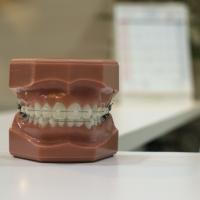Home > Blog > Diet and Fitness
Allergies: Can They Trigger the Loss of Smell?
You lost your sense of smell and may have wondered if allergies could trigger this unwelcome loss. Pay attention to the symptoms to determine the root cause of your loss of smell. In some cases, the loss of smell indicates Alzheimer's, multiple sclerosis or Parkinson's disease since it can relate to neurological conditions.
Allergies: Can They Trigger the Loss of Smell?
Allergies commonly trigger the loss of smell and taste. The senses link together closely and the loss of smell often negatively impacts the sense of taste. Your sense of smell operates on small particles that reach the nerves in the upper regions of the nose. The nerves transmit information back to the brain about the type of smell. Lose your sense of smell and the taste often follows.
The reason that allergies impact your sense of smell is because of a condition called nasal congestion. Unable to breathe through the nose, the particles never reach the nerves to relay information to the brain about the sense of smell.
Not Always Allergies
You must determine the root cause, but you may struggle with finding the cause on your own. An ENT doctor in Philly will examine the clues to see if it relates to allergies. Allergy symptoms occur like clockwork around the same time each year. You can usually expect them to last from two to three weeks.
Other symptoms to show that you may struggle with allergies include:
- Itchy, watery eyes
- Sneezing and runny nose
- Swollen nose, lips, tongue or face
- Vomiting
- Diarrhea
- Stomach pain
What Else Causes the Loss of Smell?
Other things can commonly contribute to the loss of smell, such as medications, cancer treatments and smoking. In some cases, an upper respiratory illness can take away your sense of smell. Oftentimes, an upper respiratory illness will last for about one week. You will experience a fever. Allergies, on the other hand, will never cause a fever. You know that something else caused your loss of smell if you experience that symptom.
Researchers have linked COVID-19 with the loss of smell. Along with the loss of smell, the most common symptoms people found with COVID-19 included:
- Fever
- Fatigue
- Cough
What to Know About the Loss of Smell Due to Allergies
Many reported the loss of smell as happening gradually over time. You need a doctor to adequately address it. The symptoms of COVID-19, unfortunately, overlap with the symptoms of allergies, but the biggest telltale sign is that you have a fever with COVID-19 in many cases.
How to Address the Loss of Smell from Allergies
You can avoid allergy triggers to keep from a loss of smell. How to do this will depend on the trigger. Pollen, for example, can prove difficult to avoid since it rides on the wind and you inhale it from the air. You may want to stay inside with the air conditioner and air purifier when pollen levels reach large quantities. This usually happens from mid-May through to mid-July. Tree pollen season can start as early as March or April.
Wear a facemask when outside to keep from breathing in the pollen even when not around others. Some allergy sufferers report nasal spray as effective. Nasal spray may not eliminate your allergies, but it reduces inflammation that triggers a loss of smell. Start with a mild spray such as a saline solution. You might up the dosage with an antihistamine to clear out your allergies. The doctor must write you a prescription for an antihistamine medication.
What Do They Call This Condition?
Medical doctors have given this the term allergic rhinitis, and when it happens, you will see an issue with a loss of taste and smell. Normally, when the immune system has been exposed to pollen, animal dandruff and dust, they will pose no issue to the body. The body chooses to ignore it. Those with allergic rhinitis will have the opposite happen. As the foreign agents enter the body, it responds negatively and attacks it. Due to this, the body releases histamines in response, which trigger inflammation and itching. You may spot other symptoms as well common to allergies. Antihistamines will stop the body from reacting to the release of histamines to provide relief from allergies.
How to Reduce the Risk of Loss of Smell from Allergies
Dealing with the loss of smell can frustrate you, but luckily, you can remedy the issue with several things. First, good nutrition can make a big difference. Consider adding foods to your diet such as those with Vitamin A, B6, B12 and zinc. Great sources for these nutrients include eggs, beef, dairy, nuts and whole grains. You may undertake smell training such as taking short and quick whiffs of strong aromas. Write down the aromas. Some of the recommended scents include garlic, essential oils and spices.
Finally, you might start an exercise routine. One study showed how exercise could help those with olfactory impairment. You don't need to strenuously exercise for the benefits either. Exercise increases blood flow in the body and can help the nasal passages to avoid congestion. How you exercise matters less than exercising in some form.
Conclusion
Don't worry if you lose your sense of smell due to allergies since they will return after allergy season. However, visiting a doctor may help you to reclaim your sense of smell sooner since this often impacts your sense of taste as well. Many may question if their loss of smell relates to COVID, and in some cases, they may temporarily lose their sense of smell from this illness. The biggest sign to look for is fever since allergies will never accompany a fever. That means that your loss of smell happened due to something else. A doctor is the best way to pinpoint the cause.
More to Read:
Previous Posts:






